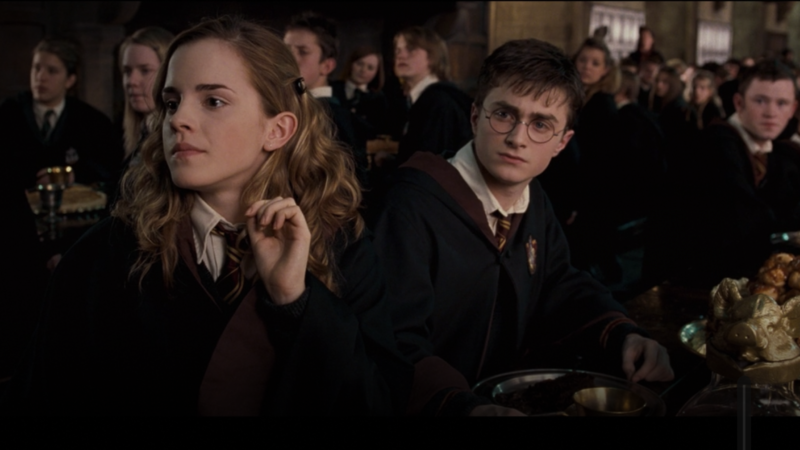Harry Potter Knew the Fake News Media Is the Enemy of the People
The 20th anniversary of the first film is an occasion to recall J.K. Rowling's inspiring political agenda.

This Christmas marks the 20th anniversary of the release of the first Harry Potter film, and on January 1, HBO Max will release a special, Return to Hogwarts, featuring interviews with the original cast. Noticeably absent from the reunion is Harry Potter author J.K. Rowling, who has become outspoken on gender issues and regularly expresses concern that the transgender activist movement is erasing the concept of womanhood. She is increasingly assailed by progressives, and thus it's possible that the controversy is the reason she's being left out. (Neither Rowling nor Warner Bros. have commented on the author's omission from the special.)
Rowling is not exactly a conservative: She has described her politics as center-left, and has supported both the Labour Party and the U.K. remaining part of the European Union. She is at the very least politically open-minded, however her books frequently toy with libertarian ideas—most notably in the later entries, when the incompetence, corruption, and eventual outright authoritarianism of the Ministry of Magic (the wizarding world's government bureaucracy) is on full display.
As a fan of the books and films who had not revisited them in quite some time, I had always remembered how unflatteringly Rowling portrayed the government of her fictional world. But I was surprised to rediscover another entity that is absolutely savaged in the Harry Potter universe: the mainstream media. Rewatching the films this month for the first time in years, I was particularly struck by how much fake news was printed in the pages of The Daily Prophet.
The Prophet is the main source of news for wizards and witches living in England. Owls deliver it daily to virtually all magical folk, including teenagers: Harry and his classmates receive the paper while they eat breakfast at Hogwarts. It is the wizarding world's version of the mainstream media; it is also an ever-evolving source of lies and propaganda.
In the fourth book and film, Harry Potter and the Goblet of Fire, the newspaper takes on a tabloid role. When Rita Skeeter, a star reporter for the Prophet, interviews Harry about his participation in a magical tournament, she misquotes him deliberately and sensationalizes his life and habits. She also writes articles falsely claiming that Harry and his best friend, Hermione, are in a romantic relationship.
But this is the least of The Daily Prophet's appalling failures. In the fifth book and film, Harry Potter and the Order of the Phoenix, the newspaper sides with the government, openly aiding the Ministry of Magic's efforts to paint Harry and his mentor, Hogwarts Headmaster Albus Dumbledore, as lunatics and conspiracy theorists. Harry and his friends know that the dangerous dark wizard Voldemort has returned, but the truth is inconvenient for the Ministry, and thus the media does everything it can to paint Harry as deranged. Sample headlines include, "Harry Potter: The Boy Who Lied?" and "Dumbledore: Is He Daft or Is He Dangerous?"
In the final novel, after the villain Voldemort has taken over the government and installed a puppet minister, The Daily Prophet becomes an outright fascist publication, in full support of Voldemort's tyrannical and genocidal agenda. Meanwhile, alternative media sources take up the cause of reporting actual news about Voldemort's sinister agenda and Harry's resistance to it. The Quibbler, a newspaper edited by Xenophilius Lovegood, father to Harry's friend Luna, starts out the series with a low reputation on account of some poorly sourced articles; toward the end, it's the only newspaper printing the truth about Voldemort. Indeed, in order for Harry to provide his eyewitness account of Voldemort's rise, he relies on The Quibbler to publish "Harry Potter Speaks Out At Last: The Truth About He-Who-Must-Not-Be-Named and the Night I Saw Him Return."
Some of Harry's supporters also launch a pirate radio program, Potterwatch, which provides information about Voldemort's attacks on non-magical folk. Podcasts and contrarian papers are the journalistic heroes of the wizarding world; the mainstream media is, to quote one notable real-world muggle, "the enemy of the people."
Many of the stars of the Harry Potter films seem eager to reprise their roles in a potential sequel series or reboot: Here's hoping that any future Potter project both 1) involves Rowling, and 2) reflects the source material's independent outlook toward the news.
A moment 20 years in the making. Harry Potter 20th Anniversary: #ReturnToHogwarts is streaming on @HBOMax New Year's Day. pic.twitter.com/xfp95HPZqR
— Wizarding World (@wizardingworld) December 15, 2021


Show Comments (87)